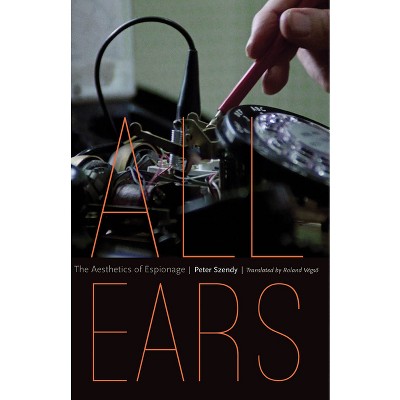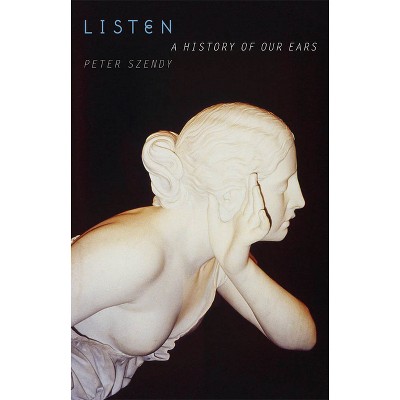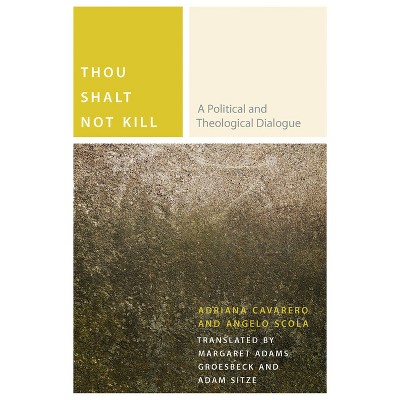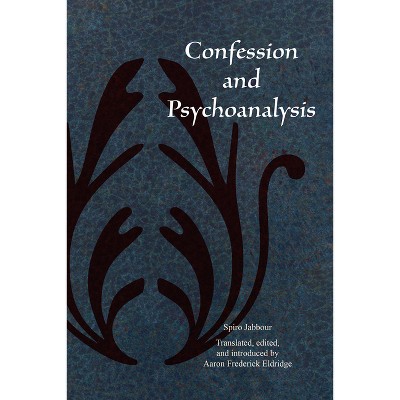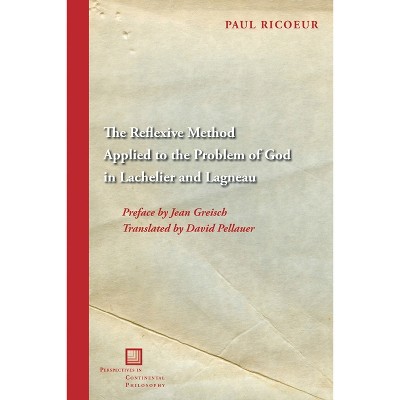$34.72 sale price when purchased online
$36.00 list price
Target Online store #3991
About this item
Highlights
- Apocalypse-cinema is not only the end of time that has so often been staged as spectacle in films like 2012, The Day After Tomorrow, and The Terminator.
- About the Author: Peter Szendy is Professor of Philosophy at Paris Ouest Nanterre and musicological adviser for the concert programs at the Cité de la musique.
- 182 Pages
- Art, Digital
Description
About the Book
By analyzing many films, by drawing on the philosophy of Lyotard, Nancy, and Derrida, this book suggest that in the apocalyptic genre, cinema is at work on its limit. Apocalypse-cinema is both the end of the world and the end of the film, the consummation and the (self)consumption of cinema.Book Synopsis
Apocalypse-cinema is not only the end of time that has so often been staged as spectacle in films like 2012, The Day After Tomorrow, and The Terminator. By looking at blockbusters that play with general annihilation while also paying close attention to films like Melancholia, Cloverfield, Blade Runner, and Twelve Monkeys, this book suggests that in the apocalyptic genre, film gnaws at its own limit.
Apocalypse-cinema is, at the same time and with the same double blow, the end of the world and the end of the film. It is the consummation and the (self-)consumption of cinema, in the form of an acinema that Lyotard evoked as the nihilistic horizon of filmic economy. The innumerable countdowns, dazzling radiations, freeze-overs, and seismic cracks and crevices are but other names and pretexts for staging film itself, with its economy of time and its rewinds, its overexposed images and fades to white, its freeze-frames and digital touch-ups. The apocalyptic genre is not just one genre among others: It plays with the very conditions of possibility of cinema. And it bears witness to the fact that, every time, in each and every film, what Jean-Luc Nancy called the cine-world is exposed on the verge of disappearing. In a Postface specially written for the English edition, Szendy extends his argument into a debate with speculative materialism. Apocalypse-cinema, he argues, announces itself as cinders that question the "ultratestimonial" structure of the filmic gaze. The cine-eye, he argues, eludes the correlationism and anthropomorphic structure that speculative materialists have placed under critique, allowing only the ashes it bears to be heard.Review Quotes
Armed with an arsenal of audacious concepts, Peter Szendy confronts the torment of blockbusters with style. Before venturing to spend your next night out at the silver screen, be sure to take this thrilling film survival manual with you."-- "--Philosophie Magazine"
"In this prodigiously intelligent book, Peter Szendy reflects on the specific nature of apocalyptic cinema. Organized as a series of brief essays on individual films and recurrent cinematic strategies, Apocalypse-Cinema offers brilliant insights on a genre that has yet to receive all the critical attention it deserves."-----Marie Helene Huet, Princeton University
Apocalypse-Cinema is a brilliantly-executed, timely book, a tour-de-force encounter with a major film genre that has been too much neglected by 'serious' film scholars. Szendy's survey of the highs and lows of the 'apo' canon is nuanced and impeccably grounded in contemporary philosophy and film theory.-----Terry Harpold, University of Florida
About the Author
Peter Szendy is Professor of Philosophy at Paris Ouest Nanterre and musicological adviser for the concert programs at the Cité de la musique. His books to have been translated into English (all from Fordham) are Kant in the Land of Extraterrestrials, Hits: Philosophy in the Jukebox, Prophecies of Leviathan: Reading Past Melville, and Listen: A History of Our Ears. Will Bishop received his doctorate in French Literature from the University of California Berkeley. He lives in Paris, where he teaches and translates. Samuel Weber is Avalon Professor of Comparative Literature at Northwestern University and Director of Northwestern's Paris Program in Critical Theory. He is the author of numerous books, including The Legend of Freud, Institution and Interpretation, Mass Medianras: Form, Technics, Media, Theatricality as Medium, and Targets of Opportunity: On the Militarization of Thinking. (Fordham)
Dimensions (Overall): 8.4 Inches (H) x 5.4 Inches (W) x .6 Inches (D)
Weight: .55 Pounds
Suggested Age: 22 Years and Up
Sub-Genre: Digital
Genre: Art
Number of Pages: 182
Publisher: Fordham University Press
Format: Paperback
Author: Peter Szendy
Language: English
Street Date: September 1, 2015
TCIN: 93508315
UPC: 9780823264810
Item Number (DPCI): 247-17-5864
Origin: Made in the USA or Imported
Shipping details
Estimated ship dimensions: 0.6 inches length x 5.4 inches width x 8.4 inches height
Estimated ship weight: 0.55 pounds
We regret that this item cannot be shipped to PO Boxes.
This item cannot be shipped to the following locations: American Samoa (see also separate entry under AS), Guam (see also separate entry under GU), Northern Mariana Islands, Puerto Rico (see also separate entry under PR), United States Minor Outlying Islands, Virgin Islands, U.S., APO/FPO
Return details
This item can be returned to any Target store or Target.com.
This item must be returned within 90 days of the date it was purchased in store, shipped, delivered by a Shipt shopper, or made ready for pickup.
See the return policy for complete information.







